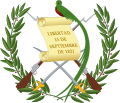| This article is part of a series on |
| Politics of Guatemala |
|---|
 |
Parliamentary elections were held in Guatemala on 18 December 1955. The result was a victory for the National Democratic Movement, which won 58 of the 66 seats in Congress.
| This article is part of a series on |
| Politics of Guatemala |
|---|
 |
Parliamentary elections were held in Guatemala on 18 December 1955. The result was a victory for the National Democratic Movement, which won 58 of the 66 seats in Congress.
| Party | Seats | |
|---|---|---|
| National Democratic Movement | 58 | |
| Guatemalan Christian Democracy | 5 | |
| Anti-Communist Unification Party | 3 | |
| Total | 66 | |